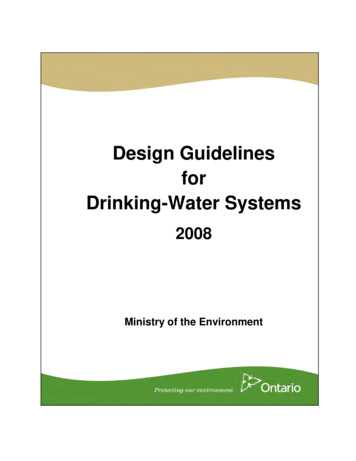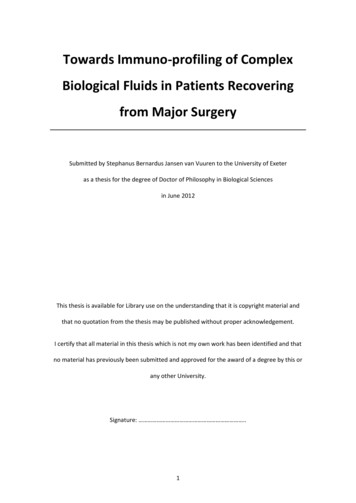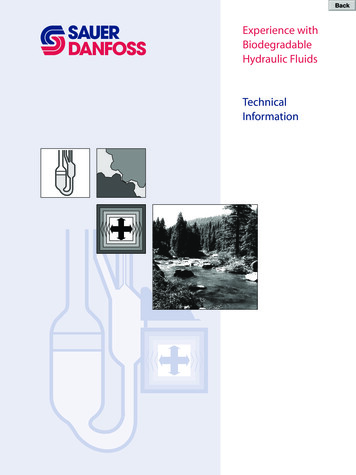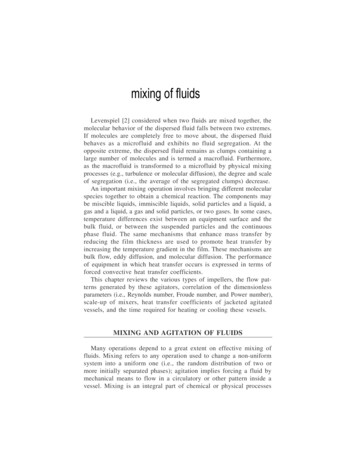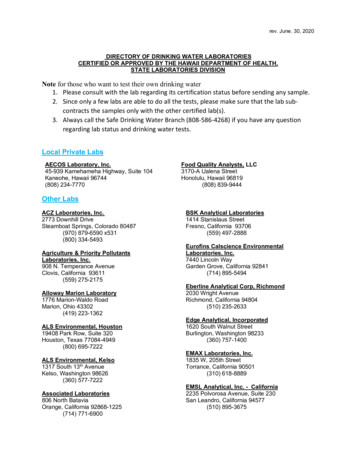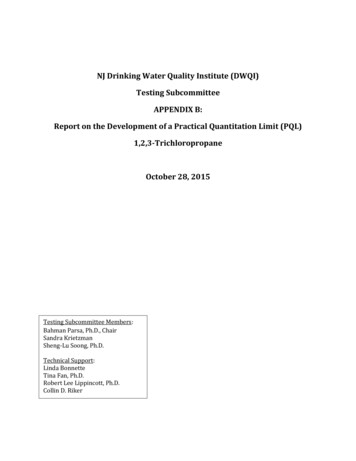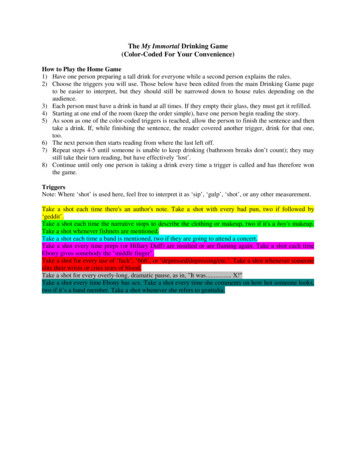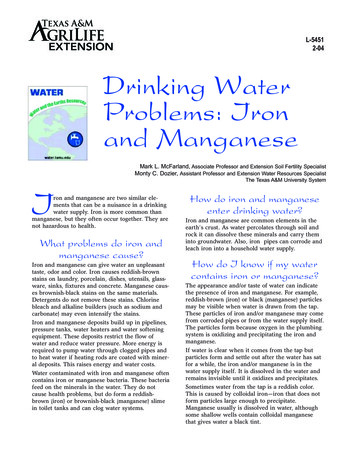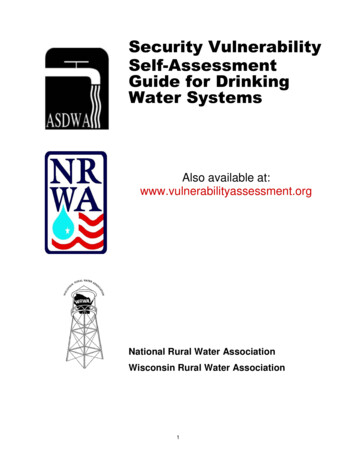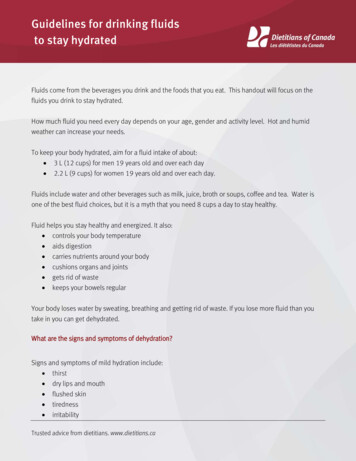
Transcription
Guidelines for drinking fluidsto stay hydratedFluids come from the beverages you drink and the foods that you eat. This handout will focus on thefluids you drink to stay hydrated.How much fluid you need every day depends on your age, gender and activity level. Hot and humidweather can increase your needs.To keep your body hydrated, aim for a fluid intake of about: 3 L (12 cups) for men 19 years old and over each day 2.2 L (9 cups) for women 19 years old and over each day.Fluids include water and other beverages such as milk, juice, broth or soups, coffee and tea. Water isone of the best fluid choices, but it is a myth that you need 8 cups a day to stay healthy.Fluid helps you stay healthy and energized. It also: controls your body temperature aids digestion carries nutrients around your body cushions organs and joints gets rid of waste keeps your bowels regularYour body loses water by sweating, breathing and getting rid of waste. If you lose more fluid than youtake in you can get dehydrated.What are the signs and symptoms of dehydration?Signs and symptoms of mild hydration include: thirst dry lips and mouth flushed skin tiredness irritabilityTrusted advice from dietitians. www.dietitians.ca
headache dizziness fainting low blood pressure increase in heart rate dark, strong smelling urine Signs of severe dehydration include: blue lips blotchy skin confusion lack of energy cold hands and feet rapid breathing high fever unconsciousness.You can become dehydrated even before signs appear. Therefore, it is important to drink fluids regularly,even before you feel thirsty.Tip: If your urine is light yellow and clear it usually means that you are getting enough todrink. Dark yellow, strong smelling urine is a sign of dehydrationSteps You Can TakeFollow these tips to stay hydrated: Drink a glass of water when you wake up each morning or before you go to bed. Keep a fresh glass of water by your desk or on hand where you work. Carry a container of water with you throughout the day. Drink a glass of water before eating your meals. Make sure you have a drink with each meal such as a glass of low fat milk, soy beverage or water. Don’t ignore thirst. Drink water or another healthy drink when you feel thirsty.Trusted advice from dietitians. www.dietitians.ca
Fluids to Choose FromTipsWater Fruit or Vegetable Juice Water is calorie free and a great way toquench your thirst.Add a slice of lemon or lime to make itmore refreshing.Drink tap water. You don’t need to drinkbottled water.If you drink well water it should be testedregularly.Limit your intake of fruit juices since theyare high in calories and low in fibre.Eat the fruit instead.125 mL (½ cup) of juice is a serving offruits and vegetables.Make sure you choose 100% real fruitjuice.Avoid fruit ‘drinks’, ‘cocktails’, ‘punches’ or‘beverages’ as they have sugar added andless nutrients.Milk/Fortified Soy or Rice Beverages Aim for 500 mL (2 cups) of low fat milk oralternatives (less than 2% M.F.) as part ofyour fluid intake for the day.Soft Drinks Choose soft drinks less often. Regular softdrinks are high in calories and sugar andlow in nutrients. Some soft drinks, such ascolas, may also contain caffeine.Diet soft drinks are calorie and sugar freebut may still have caffeine. Trusted advice from dietitians. www.dietitians.ca
Broth and SoupsBroth and broth-based soups can be a goodsource of fluid. However, most canned ordehydrated broths or soups are high in sodium(salt). Try making your own or choose preparedbroths or soups lower in sodium.Sport Drinks Sport drinks are usually not needed to keephydrated when you exercise.Water and a healthy diet will replace waterand minerals lost during exercise. If youexercise very hard, in extreme weather, fora long time or wear a lot of sportsequipment you may benefit from a sportsdrink.For more information on sports hydration,see the Additional Resources below.Tea and Coffee(e.g. herbal tea, regular and decaffeinatedcoffee/tea ) Coffees and teas are not dehydrating. Limitcaffeine intake to about 400 mg per day.That is equal to 750 mL (3 cups) of blackcoffee or 1 L (4 cups) of black tea per day.Drink herbal teas or decaf coffee if youwant to have more than the recommendedamount of caffeinated beverages.Limit specialty coffees and teas. They canbe high in sugar.If you are pregnant limit your caffeineintake to 500 mL (2 cups) of coffee or 750mL (3 cups) of tea. Trusted advice from dietitians. www.dietitians.ca
Steps for Special Consideration: If you have diarrhea or vomiting, it is easier to become dehydrated. It is important to drink fluidswhen you are feeling unwell. If you become dehydrated when you are sick you may need to take anoral rehydration solution. Talk to your pharmacist to find out which one would be best for you. If youhave diarrhea or are vomiting and think you may be dehydrated call your provincial toll-freetelehealth number or your doctor.During pregnancy, your body is going through many changes. You may need to drink more. Aim for2.3 L (about 9 ½ cups) of fluid per day. Drink plenty of fluids to help prevent constipation, which iscommon in pregnancy.If you are breastfeeding, drink plenty of fluids to help maintain your milk supply. Aim for 3.1 L (12½cups) of fluid per day. Drink a glass of water each time you breastfeed your baby to help you stayhydrated.Additional Resources1. EatRight Ontario, Sports Hydration2. www.onpen.ca/Docviewer.aspx?id 74623. Telehealth Ontario 1-866-797-0000UNTIL NOV 2017 2014 Dietitians of Canada; may be reproduced in its entirety. For non-commercial use only.
3 L (12 cups) for men 19 years old and over each day 2.2 L (9 cups) for women 19 years old and over each day. Fluids include water and other beverages such as milk, juice, broth or soups, coffee and tea
